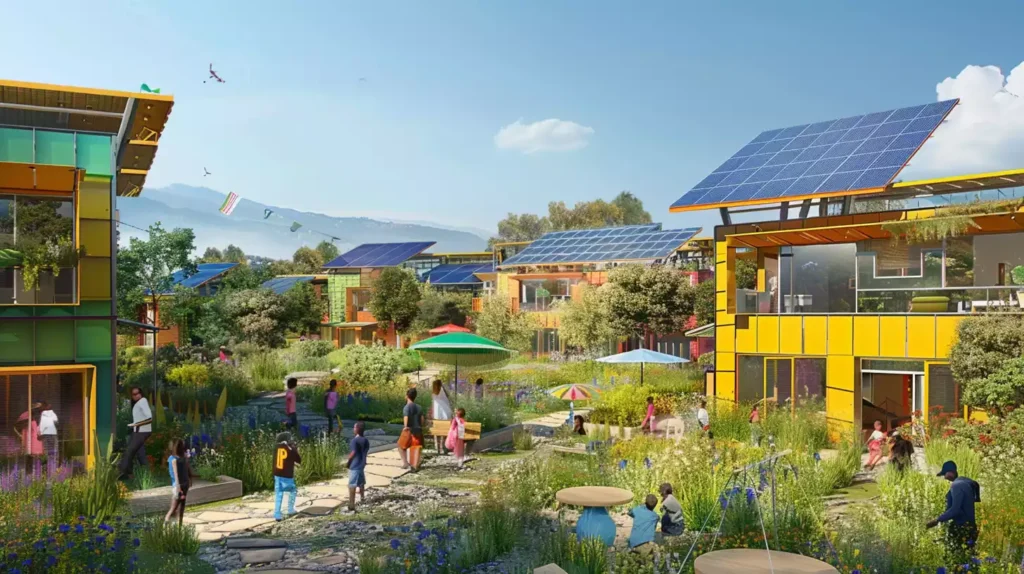Don’t Let Bad Credit Stop You: Ways to Finance Solar Panels
Getting solar panels with bad credit is feasible through various non-traditional financing options such as Lease-to-Own Programs and Power Purchase Agreements, tailored state-specific programs like GRID Alternatives’ Energy For All, and credit improvement strategies focusing on debt management and timely payments.
Community solar programs and trusted solar lender searches offer accessible avenues to investigate. These options provide a diverse range of solutions for individuals looking to invest in solar energy while managing credit challenges.
Finding the best solar loan involves comparing different lenders, examining requirements, and considering location factors. These options provide a diverse range of solutions for individuals looking to invest in solar energy while managing credit challenges.
Quick Summary
- Explore lease-to-own or power purchase agreements.
- Research state-specific low-credit solar programs.
- Consider community solar options for shared benefits.
- Improve credit with timely payments and debt management.
- Seek specialized solar lenders for tailored financing solutions.
Understanding Credit Scores
Understanding credit scores is vital for individuals looking to secure financing for solar panels, especially when dealing with poor credit. When it comes to solar, credit score requirements play a significant role in determining the financing options available.
With poor credit, traditional loans may come with higher interest rates due to the increased risk for lenders.
However, there are still paths to investigate for financing, even with less-than-perfect credit. Home improvement loans or solar-specific financing options might be accessible, albeit potentially with stricter terms. It’s essential to monitor your credit score regularly, as improvements can lead to better loan terms over time.
While poor credit can pose challenges, taking steps to enhance your credit profile can open up more opportunities for solar panel financing.
Understanding how credit scores impact loan options is a critical aspect of starting on solar projects, paving the way for a brighter, more sustainable future.
Non-Traditional Solar Financing Options
When looking for solar financing with bad credit, considering non-traditional options like Lease-to-Own Programs and Power Purchase Agreements can offer accessible solutions. These alternatives provide avenues for acquiring solar panels without the stringent credit requirements of traditional loans.
Exploring these options can open up possibilities for homeowners seeking renewable energy solutions despite credit challenges.
Lease-to-Own Programs
Exploring lease-to-own programs for solar panels can provide a flexible financing option for individuals with bad credit. Delve into this option to access solar energy benefits even with a low credit score:
- Lease-to-own programs allow you to lease solar panels with an option to buy at the end of the term.
- These programs provide an affordable way to access solar energy without requiring a high credit score.
- You can enjoy the benefits of solar energy while gradually building equity in the system through lease-to-own arrangements.
- Lease payments may be lower than traditional loan payments, making solar energy more accessible to those with bad credit.
- Consider lease-to-own options from reputable solar companies to start benefiting from solar energy regardless of your credit score.
Power Purchase Agreements
Interested in a unique way to benefit from solar energy without owning the panels? Power Purchase Agreements (PPAs) offer a cost-effective solution for accessing solar energy, even with bad credit.
With PPAs, a third-party owns and maintains the solar panels on your property, allowing you to enjoy immediate savings on electricity bills. You pay for the generated electricity at a lower rate than your utility company, making it a financially savvy option.
One of the key advantages of PPAs is that they eliminate the need for any upfront investment, making solar energy more accessible to a wider range of individuals. Consider exploring PPAs as a convenient and efficient way to harness the power of solar energy.
| Benefits of PPAs | Description |
|---|---|
| Lower rate electricity | Pay less for solar-generated electricity compared to traditional utility rates |
| No upfront investment | Access solar energy without needing to make an initial payment |
| Immediate savings | Enjoy reduced electricity bills right from the start |
| Third-party ownership | Let a third-party handle the maintenance and ownership of the solar panels |
State-Specific Low-Credit Programs
State-specific low-credit programs cater to individuals with poor credit scores, offering accessible solar solutions in various states. These programs aim to make solar panels a reality for those facing financial challenges.
Here are some key points to explore:
- GRID Alternatives’ Energy For All Program: Offers low-to-no cost solar systems in California, Colorado, Maryland, Virginia, and DC for those with low credit.
- California’s Single-Family Affordable Solar Homes Program: Provides upfront rebates specifically for low-income individuals with bad credit.
- Various states offer tailored programs: These programs cater to low-income or low-credit individuals seeking solar solutions.
- Eligibility varies: Based on location and income qualifications, so it’s essential to check the specific requirements in your state.
- Making solar energy accessible: These state-specific programs aim to bridge the gap for those with bad credit or limited financial resources.
Exploring these state-specific options can lead to finding the right program that fits your needs and helps you go solar, even with bad credit.
Community Solar Consideration

When exploring solar energy options, community solar presents a viable solution for individuals with bad credit or limited ability to install panels on their property.
Community solar programs allow participants to benefit from shared solar installations, receiving credits on their utility bills for the energy generated.
This eliminates the need for upfront costs and maintenance typically associated with traditional rooftop solar systems. Even renters can subscribe to a portion of a community solar project, enjoying savings on their electricity bills without requiring good credit.
Not only does community solar provide a practical way to access clean energy, but it also offers a more inclusive approach to solar power.
By joining these programs, individuals with bad credit or those unable to install solar panels on their property can still contribute to environmental sustainability while reducing their utility expenses. It’s a win-win situation that makes renewable energy more accessible to a broader range of people.
Credit Improvement Strategies
Improving your credit score is vital when considering solar panels. Start by checking your credit report regularly and seeking advice from a credit counselor.
Focus on payment history, debt management, and credit utilization to enhance your creditworthiness.
Credit Score Basics
To enhance your credit score, focus on consistently making timely payments and reducing outstanding debt. Understanding credit score basics is important when looking to finance the installation of solar panels.
Factors like your credit score can impact the interest rates you receive on loans, including personal loans for solar panel installation. Keeping an eye on your credit score, especially the minimum credit score required for financing solar projects, is essential.
Solar tax credits can also be affected by your creditworthiness, making it important to maintain a good credit score. Utilizing credit monitoring services can help you track your progress and improve your FICO score over time.
Payment History Importance
Maintaining a positive payment history is vital for improving credit scores and increasing financial opportunities. Your payment history plays a significant role in your credit score, making it essential for credit enhancement.
Consistent on-time payments can have a considerable impact on your credit scores over time, while late or missed payments can greatly reduce your credit scores and impact your chances of loan approval. Setting up automatic payments can help you maintain a positive payment history effortlessly.
Negotiating payment plans with creditors can prevent negative marks on your credit reports, further safeguarding your financial standing. By staying on top of your payments and communicating with your creditors, you can build a solid payment history that enhances your creditworthiness.
| Positive Aspects | Negative Aspects |
|---|---|
| On-time payments | Missed payments |
| Automatic payments | Negative marks |
| Payment plans |
Debt Management Tips
As I work on managing my debts, reducing credit card balances and making timely payments are essential steps to enhance my credit score and demonstrate responsible financial behavior. To improve creditworthiness, consider debt consolidation for lower interest rates and simplified payments.
Negotiating with creditors can help create manageable repayment plans and prevent negative impacts on credit. Seeking guidance from a non-profit credit counselor can provide personalized debt management strategies tailored to your situation.
Finding the Best Solar Loan
When seeking the best solar loan for my needs, it’s essential to compare options from different lenders to secure favorable terms based on my financial situation. Solar loans vary in credit requirements, so examining lenders that offer relaxed standards for existing customers can increase approval chances.
The EnergySage Marketplace is a great platform to discover diverse solar financing options, allowing me to investigate various loan choices. Before committing to a solar loan, it’s important to review payment details and lender reputation to make sure it aligns with my requirements.
To find the best solar loan, I must consider factors like location and credit profile. By selecting a loan that suits my location and creditworthiness, I can maximize affordability and benefits.
Evaluating the lender’s reputation and payment terms will help me make an informed decision that caters to my specific needs and financial capabilities. By taking these steps, I can secure a solar loan that isn’t only accessible but also advantageous for my situation.
Trusted Solar Lender Search
Navigate EnergySage’s trusted solar lender search feature to discover reputable financing options tailored for individuals with bad credit. When exploring this platform, you can benefit from:
- Accessing a network of reputable lenders willing to offer financing options despite a low credit score.
- Connecting with specialized solar lenders who understand the challenges of securing financing with bad credit.
- Exploring curated lists of solar lenders on EnergySage who may consider applicants with less-than-perfect credit histories.
- Finding tailored solar financing solutions from reputable lenders, regardless of your credit score.
- Leveraging EnergySage’s platform to connect with lenders who are experienced in providing financing for solar panels even to those with bad credit.
Using EnergySage’s resources can help you navigate the world of solar financing with confidence, even if your credit score isn’t where you want it to be.

